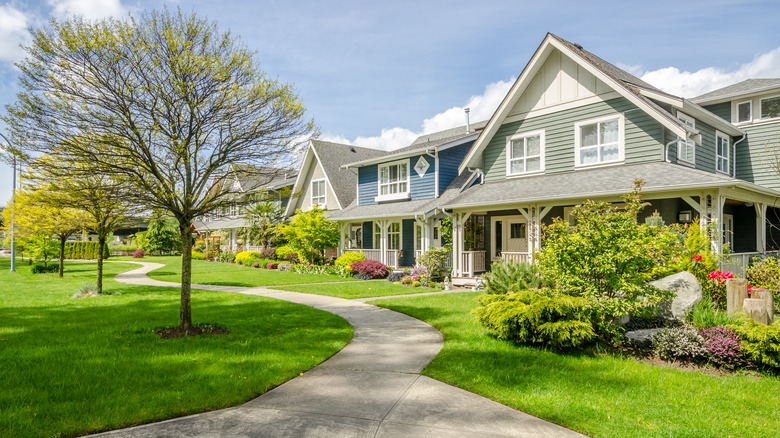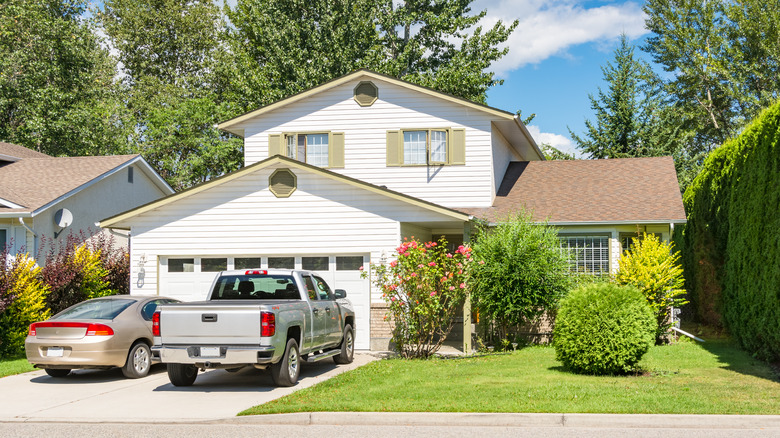3 Things You Should Know Before Buying A Home In The Suburbs
Thinking of transitioning into suburban life? Perhaps you're jumping at the opportunity given that the uncertainty of the housing market has spurred you to take the plunge, or you don't really need to go into your city office anymore due to the pandemic. Whatever your reason is, you should be well informed on how life could change for you if you decide to move.
Living in the suburbs generally refers to living in a less-populated area outside the metropolitan area or city that is primarily residential (via Bungalow). Suburban living is usually sought after over apartment living because there is more value for the cost, more space, and a calmer pace of life. It isn't the best, however, if you want a very active social life or have a long commute. Whether you're a new homebuyer or you're thinking of getting a vacation home, here are three things you need to know before you buy a home in the suburbs.
It's a close community
Before you buy a home in the suburbs, know that it is very important to establish relationships with your neighbors. While it is typical to live in an apartment and hardly know others in the building, being in the suburbs means having to get to know your neighbors. Close communities are common and also necessary in suburban areas because the whole experience is largely affected by how everyone relates to each other. It's a primarily residential area, which means the residents are a major part of it! Doing this helps you learn about your new neighborhood, remain in the know about what's happening, and also stay safe. You will reap short-term benefits, such as getting properly adjusted to the new area, and long-term benefits, like having a support system that you can rely on for anything.
You should also think about what you can add to the community and be mindful of your impact on the area. According to Homes, being a good neighbor looks like following the rules, lending a helping hand, and being respectful. Some ways to get plugged into the close community of the neighborhood are through social media, online platforms, local events, and the old-fashioned route of introducing yourself in person. The downside to having such a close community is that there can be a lot of tension due to the high level of involvement in each others' lives. Be prepared to deal with yard envy, major renovations, and other types of disputes.
You'll have a lot of space
You'll have all the space you've ever wanted! But how will you manage it? The suburbs are a great choice for those that want amenities like a garage, garden, or even an outdoor kitchen. However, these things come with added responsibility as there can be a lot of maintenance and upkeep involved. From the interior of the house to the yard, there will be much more cleaning, fixing, and decorating than there probably was in your apartment, which can be costly and labor-intensive. To cut down on the costs of improving your home, Mid-West Moving & Storage recommends checking out the many flea markets, second-hand stores, and discount stores that are usually found in the suburbs.
There will also be a lot of hosting happening in your home because there might not be a lot of convenient options for your family and friends to go out and gather. To help with this, The Boston Globe suggests you find an oasis, which is a central area where you can find everything you need, from restaurants to stores. The good thing about all the extra space is that it means ample room for children and pets to play, as well as the comfort of more privacy. On the other hand, expect a lot of quiet, especially at night, as there won't be bustling streets or hordes of people moving around.
Suburbs are car-centric
Before you buy that home, consider that life will be mostly car-centric. Cities are designed to be walkable and usually have dependable public transit systems that can take you around. Suburban roads, however, are designed mainly for cars, per Mobility Lab, and you won't be able to move around that easily otherwise. The good news is that there are pros and cons of having to depend on your car, and there are always ways to improve the experience.
The downside to being reliant on a car is that driving too much, especially when you have a long commute, can negatively impact your health and the environment. So, what can you do? If you don't need a car or prefer not having one, realtor.com advises choosing a home that's conveniently located near everything you need and embracing alternative ways of getting around like walking and biking. For those that need a car, you can enjoy the convenience of being able to load up on groceries or take the children out. It puts you in complete control of when you leave and return and cuts down on your transport time. Also, you don't have to worry about carrying lots of things or forgetting things at home!



